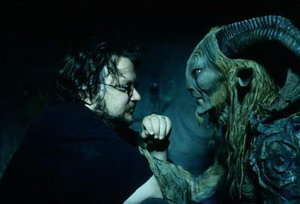
Graham Leggat, Executive Director of the San Francisco Film Society, introduced Guillermo Del Toro following the Embarcadero Landmark screening of Pan's Labyrinth. As with my interview with him, Del Toro is not a man to censor himself and his comments get into the film in detail so those who are offended by such language or equally by spoilers might best skip this write-up until they've had a chance to see the movie.
To get the ball rolling, Leggat referenced Mark Kermode's interview with Del Toro in the December issue of Sight & Sound, wherein Del Toro talked about Clive Barker, the writer responsible for the Hellraiser series of films, who had written of "a deep place touched only by monsters." In that interview Del Toro went on to speak about how a deep part of him had been touched and transformed by monsters. Leggat asked him to amplify.
Del Toro complied: "In the Barker story ["The Skins of the Fathers"] he actually literally means it because it's a woman who has intercourse with monsters. I love monsters and I think fantasy is the last refuge of spirituality in this time because we have essentially [gone] through the '50s and '60s and '70s, and all the iconoclastic taking down of—rightfully—disgusting institutions; but, anything that was erected after that essentially was or has become as hollow as those institutions. So we took down all the crap and we erected new crap. [Laughter.] We erected every boring, materialistic sort-of-reality t.v. shit to drive us on. I believe that in this age one of the few moments where I can feel like a child and can feel spiritually uplifted is through fantasy. I really believe in monsters in the way that a Baptist would receive Jesus. …Monsters were invented by primitive man to explain—first of all—nature. Then as they became socially more complex they started inventing monsters to talk about the things that scared them about themselves and eventually it's psychological. Monsters have a direct tap into spirituality and consciousness. I feel that I have an intimate, almost religious, contact with fantasy creatures."
Leggat noted that in an anti-fascist fairytale such as Pan's Labyrinth, or even in many of the classic fairy tales, there's a tension between innocence and brutality. Referencing back to the Sight & Sound interview, he noted Del Toro's comment that he can't feel the magic without the brutality of realism. Leggat queried if that was tied up with Del Toro's description of the monster inside?
"The origin of the fairy tale," Del Toro answered, "is an oral tradition. Normally what would happen is cobblers and tailors traveling from town to town would stay at homes and charge a warm bed and a meal and then the whole family would sit around the cobbler or the tailor and they would tell a story, many times about a cobbler and a tailor in a fairy tale. That's why they figure so prominently in fairy tales. They had to entertain the whole family, children and adults, so they talked about contexts that felt alive and contemporary at that time. They talked about famine. They talked about war, pestilence, and they peppered [the stories] with incredibly brutal moments either to entertain the adults or to scare the children shitless [laughter] and into behaving. So there [are] two kinds of fantastic tales: one is extremely repressive, pro-establishment, and tells the children don't go out at night, obey your parents, don't be ambitious, and this kind of thing; and then there is the other one, which is absolutely insane and brutal. But all of them were peppered with really dark, incredibly almost Freudian, elements. I felt that they had been [whitewashed] and sweetened and taken beyond recognition into being Disneyfied, if you would. I wanted to recuperate the brutality because I believe that without a context of horror then the magic is meaningless. If all you're going to have is little elves singing happily all the fucking time…. [Laughter and applause.] The fact is my fantasy has always been absolutely non-liberating. It has helped me deal with the real world but I never imagined myself singing to little bluebirds or chipmunks or stuff like that. The way I see fantasy is not a way to escape reality but to articulate reality. To use those elements to learn your way around the world and I believe that fantasy is a way to create parable, to talk about big truths but in a way not married to outcome, or married to a political outcome, an immediate outcome. Darkness is necessary in those cases to bring forth … this movie, if it worked with you—because a movie, I keep saying, is like a blind date, y'know?—if it worked with you, if it tickled you in the right places, then the movie hopefully transported you to a vulnerable place where you can be a kid again. Now we, as adults, in order to be shocked by the horror like a kid and experience the wonderful like a kid, I have to push your buttons and they're hidden under layers and layers of social fat. I have to push really hard like deep tissue massage…. When I was learning how to be a draftsman and opened one of the early books about how to draw with a pencil, the first thing they set up was that—in order to create the illusion of volume—you need darkness and light and that's exactly what this fable is [about]."
Alluding to Del Toro's infamous refusal to direct The Chronicles of Narnia perhaps for these very reasons, Leggat wondered if Del Toro found the extreme world of anime more compelling than, say, Harry Potter?
"The Narnia thing," Del Toro quickly responded, "is because I'm a lapsed Catholic and I didn't want the fucking lion to resurrect." [Laughter and applause.] "Why bother? Also, I loved the books when I was growing up and at that time I was jerking off behind the altar. Some of the anime I love. A lot of the anime I don't. The Harry Potter movies, for me, the books—which I read before seeing the movies—they were really beautiful books and the first time I saw the first and second movies they were almost so healthy that they looked like a yogurt commercial. They looked so healthy, I thought, 'Is this the same book that had this Charles Dickens orphan living with his relatives?' I didn't really recognize him that much."
Leggat then opened the conversation up to questions from the audience. One young fellow, gracefully acknowledging first Del Toro's Golden Globes nomination and inducing a deserved round of applause, then queried if Takashi Miike was a direct influence on Pan's Labyrinth?
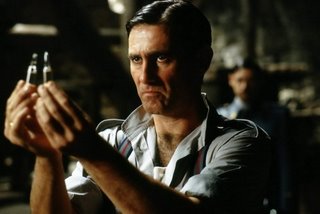
"No," Del Toro denied, and then inquired if the young man meant the scene where Mercedes slashed Vidal's mouth? "They do it in many cultures and in Britain this is called the 'Chelsea smile.' If you're a traitor, they do the Chelsea smile to you. What I wanted … both in Devil's Backbone and in this one there is a moment where the character … I'm very interested in the proto-fascist to look really sleek. This guy [has] shiny boots, beautiful hair, [is] incredibly well-spoken; he's a gentleman, right? He can bash and kill and all that but when his wife leaves the room, he gets up from the chair. I was interested in him starting to look on the outside the way he looks on the inside and the same was true in Devil's Backbone. So I did the half-Chelsea on him because I wanted to prove several things. I needed that shot where he's sewing himself because it's a character moment. That shows you what type of guy this guy is. He shines his own boots. He fixes his own watch. And he sews himself up. This man is unstoppable. He's not going to stop. He's going to keep going. And then I want him to drink the drink, hurt, and what does he do? He pours another one! It's defining the character. It's a moment that's larger than life that turns him into the Big Bad Wolf. The fairy tales needs Little Red Riding Hood and it does need the Big Bad Wolf. That was not Takashi Miike; that was the half-Chelsea smile.
Actually, the young fellow corrected, that wasn't what he had in mind. He was wondering if Miike's Yôkai daisensô / The Great Yokai War (2005) was an influence on Pan's Labyrinth?
Again Del Toro denied a connection. "I love Miike. I saw The Great Yokai War about two months ago because there was going to be a scene in Hellboy 2 originally that had Yokai ghosts, which budget-wise has been eliminated now. Somebody said, 'Oh, you should check Miike's version of the Yokai wars'; but, I didn't see it during the shoot of Pan's Labyrinth. I like his movies. Audition scared the fuck out of me. That moving bag haunted me for ages and the sawing of the foot lives in my memory. I really love his sensibility but he's done so many movies and I've only seen probably 10 of them. So I have—what?—65 to see?"
One young woman wondered about Del Toro's research methodology, what he had read to prepare for this movie, and if there were possible allusions to the Little Mermaid fairytale?
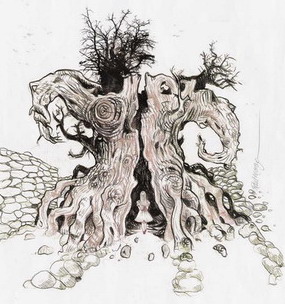
"I've been collecting fairy tales all my life," Del Toro responded, "I have—I don't know—maybe 200 volumes. A few of them are original printings from the Victorian era illustrated by Edmund Dulac, Kay Nielsen, Arthur Rackham and the like. I am actually an avid collector of original art by Kay Nielsen. I've always been interested in reading the compilations and treatises about fairy lore. I've always found them a little dogmatic. It seems like they have a thesis to prove—either a psychosexual or social—and they go by it. I have enjoyed Angela Carter. I have enjoyed Bruno Bettelheim. I have enjoyed everyone. But the one book that became incredibly important in this movie was a book called The Science of Fairytales, which is a late Victorian book that has a prologue by A.A. Milne, the author of Winnie the Pooh. The book is an incredibly [scholastic], incredibly amusing but thorough inventory of how fairytales came to be, how the fantastic tale came to be, in all the cultures, not only Europe. It does a very unprejudiced inventory, sort of the way Joseph Campbell does it later in his books but far more open, far more light. I encourage you to seek it and you know what? If you can Google it, you can download it, because it's free to print on the Internet. I always browse in used book stores and I get nose and ear infections. I found the book and I bought it and I read it and then I found it on the Internet. It's a beautiful book. There is another book that I love that, for example, Mike Mignola also uses a lot in his comic books called Passport to the Supernatural by Bernhardt J. Hurwood. Those two books have a similar spirit in that, after reading them, you want to read everything that was [quoted]. Hurwood quotes everything from oral tradition, Plotinius' writings, he quotes a great 17th century book by Don Augustin Camlet about vampirism that talks about microscopic vampires and all [those] kind of things. The movie quotes everything because I wanted to have the story feel like an ancient fairy tale. It has homages to Wizard of Oz with the red shoes. I quoted exactly the Alice in Wonderland dress. I quoted C.S. Lewis—without the lion resurrection. I quoted Hans Christian Anderson also in the spirit. Anderson and [Oscar] Wilde have a really incredibly strange and moving sort of S&M thing going on. I'm not exactly able to pinpoint it but it's disturbing and moving and spiritual and, rather than try to explain it, I love it and assimilate it. Hans Christian Anderson was also whipping himself into submission for his desires—Wilde was a little more free—and what I think is the idea of sacrifice comes from him. I actually quote verbatim Charles Dickens' David Copperfield when the stepfather says, 'It's the other hand, Ofelia', which I think is chapter 3 of David Copperfield when he meets his step-father the first time. At the end her seeing this wonderful world is an exact quote of "Little Matchbook Girl" by Hans Christian Anderson and so on and so forth." Del Toro repeated the title of the two main literary influences on the film: The Science of Fairy Tales and Passport to the Supernatural. "I recommend like Oprah," he grinned, which roused a rush of laughter from his audience.
Another fellow noted that Del Toro is one of the only directors who actually shows children dying. In Mimic Del Toro actually shows the children being killed, though in Pan's Labyrinth he pulled back a bit and didn't actually show Ofelia's murder.
"No, actually I show the shooting," Del Toro qualified. "The violence in the movie is deliberately dosified and calculated. I was in favor of the structure of the movie. We live in a completely hypocritical world where we can bombard entire cities [but hurting children—in concept—is taboo]. We can eat the meat but we can't kill the cow. We don't mind the fucking package in the supermarket but we would be unable to kill the cow. It's the same in the world. We are raising these antiseptic fucking little brats to feel nothing, to shield them from pain, to shield them from imperfection, shield them from anything, and they grow up to be 35 year olds with the mind and the spiritual potency of a four-year-old kid. I find a movie like Free Willy much more obscene where they tell you, 'Oh, if you swim next to a fucking killer whale, he's going to be your friend. He won't chew your fucking legs and spit your intestines out.' [Laughter.] I find that kids are far more intelligent, far more sophisticated, than we give them credit for. We are brutal with children in the real world, allow brutality to exist towards children by the church, by society, by everything, but we shield them in the stories. I find that impossible to conceal. The way we treat them, the way we have laid out the world is so fucked up. We pass our hang-ups. We pass the crap from generation to generation but we want to make the fiction clean. The most truly liberating aspects are the ones that we overprotect. We can bomb the fuck out of Iraq but we won't tell our children about Winnie the Pooh bleeding. It's insane to me. Children in fiction—especially adult fiction—they're just another character in the same way that [on] my set a child actor is just another actor. I don't come in and say [coddling], 'Listen, my darling, that is a rubber man." I take them through the steps and, like another actor, with respect.
"There was a scientist in the mid 20th century, a brilliant crazy guy who actually invented ice ships for Churchill for World War II (and they were working). He was very interested in education. He said something brilliant. He said, 'Children should be treated like ambassadors from a more advanced culture who are here to teach us things instead of us trying to teach them our pathetic, stupid way of seeing the world.' I think it's hypocritical to do this. If I were doing a movie for 8-year olds and all of a sudden cut the throat of the two main children, I would say, 'Well, I'm as sick as fuck.' But this is for adults. So it's fine."
The same fellow had a follow-up question regarding Del Toro's brave depiction of the Faun as ambiguously evil, redeemed by film's end.
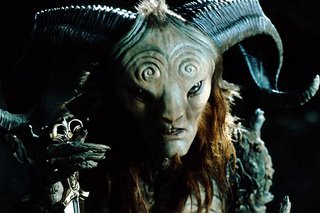
"The Faun is more ancient than Western culture," Del Toro reminded. "The Faun is not a trickster as Campbell would pose it. The Faun is definitely a neutral character. He was a benign faun. 'Pan' is only in English. [The original film title is El Laberinto del Fauno, The Faun's Labyrinth.] If he was Pan the girl would be in deep shit. [Laughter.] Believe me, that girl would be walking sideways by the time Pan would be done with her. No, he's a faun. The Faun, in its original conception, is a character that is neutral. He cares for the woods but he can destroy it, he can kill. It's a character that is neutral in that sense, like nature. The idea was that this character is there just to guide her through the process. He doesn't have an investment [in] the outcome of the tests. One of the things I tried to do with him is the more the tests advance, the younger and more beautiful he becomes. Towards the end he's actually—the way I was directing him, I was telling him—he's like a glam rock star. As a director I told him, 'You have to move differently, be more sensual, be more beautiful, because it was important for me that [Ofelia] rejects him, not only when he looks bad, but when he looks the best she also says no. [She's] going to follow [her] gut. The three tests are a decoy. The real test is how she goes through them. If at the end the last test is supposedly, 'Give me the baby', if she turns the baby in that's not passing the test. If you notice in the movie one of the things I tried to do is the Faun is played by the same guy who plays the Pale Man because to me its two incarnations of the same character putting her through paces to see how she will react and seeing if she will learn from her disobedience and not lose the capability to disobey what she feels is wrong. Meaning she can disobey and it's great but then again at the end she's not intimidated by her mistake. She still disobeys the Faun [when he says], 'Give me the baby.' If you notice, the two fairies who are the Red and the Blue that are eaten by the Pale Man in the banquet hall, they come back at the end and circle around her so they were never really eaten."
Asked if the fascist character—though sleek and great looking—exhibits self-hatred through the nuance of cutting his own throat in the mirror when he's shaving, Del Toro confirmed that was his intent. "When you create fascists, when you create characters, these are not by any means intended to be Dostoevskian three-dimensional fully-fledged psychological portraits. These are types. These are characters that I hope are great but they are type characters. You cannot nuance both the story and fuck up with the story and fuck up with the characters; you're taking two legs out of a chair. Something's going to fall. I like to screw up with one leg and keep the others firmly planted in the genre or in the tradition. [Capítan Vidal], what I was thinking of him, is it's a character that the only thing he needs to have is flaws and reasons to be the way he is. Now this is a guy who was raised by a general. Whose only legacy is a broken watch to tell him, 'You're going to be like me. Tell my son how a man dies.' You can imagine the educational process of that father. It's not exactly fantastic and the guy even lies about his father's watch, that's how intimidated and how bad he feels about his own career, which is he's a captain in the military police hunting ragtag guerilla bands in the mountains while his father was a legendary general. This guy hates himself more than he hates anybody else. To me the fascist creates a whole legend, a whole construction, through his legacy because he's worried about leaving a memory that will live forever. It's his legacy and his construction that are fragile. On the other hand, the girl who is not worried about anything really leaves a legacy and lives forever in my mind in the movie. Kierkegaard said the reign of the tyrant ends with his death; the reign of the martyr starts with his. [This is] the difference. Look at the way the two characters physically die. The girl dies after going exactly to the place she wants to go, in her heart, and for me that's real. The captain, the last thing they tell him is, 'He'll never know your name' and he's completely destroyed. Everything that he believed in was that fragile. These people are like that. They live in another world. When you live in Spain long enough and, trust me, there's still a shitload of right wingers in Spain that miss Franco, they wish the Generalisimo would come back! These guys believe what he did. [Vidal] says, 'I want a new, clean Spain for my child to be born in." He really is doing these things [he perceives] to inhuman people. The Marquis de Sade used to say, 'I can understand the crime of passion. I can understand somebody murdering somebody in the heat of the emotion. But what I cannot understand, and what I cannot condone, is murder for ideas and laws. That someone can coldly, calculatedly, say that this law or this idea allows me to kill you.' This is what happens when you dehumanize somebody. When that guy becomes a Black guy, a Jew, a Muslim, whatever idea you want that allows you to kill him, you are relinquishing your own decision. You are relinquishing your own choice. You're making it impersonal. [The fascists] do that, killing [others] 'for the good of Spain.' When I was [on] the radio in Spain with this movie a guy called and said, 'Why do the fascists always have to be the bad guys in the civil war movies?' [Laughter.] I said to the guy, 'Listen, Sir, where I come from the word fascist has pretty bad connotations but if you know of any charming fascists and would like to bring them to the radio, please feel free to do it.'
"Everything in the movie tries to do parallels with things in the real world. There are two keys; one in the fantasy world, one in the real world. There are two daggers; the dagger that she hides and the dagger that she [finds]. The geometry of the dining room of the Pale Man and the geometry of the dining room of the captain are exactly the same. My idea is that these things are things that the girl catches on the fly and uses them to construct her imagination. And that is me. The Pale Man is the church. He has the stigmata. He puts the eyes in there. He devours children. [Laughter.] I was in Jesuit school. I'm not going to be a forgiving man. But the idea is these are things that feed into the angst of the girl and she's building her own little world with that or coding it like that. By the way, most of the violence in the movie is either based on oral accounts that I have read on things that happened during the civil war. In the case, for example, of the dialogue of the priest where he says God [cares little] about their bodies, he has already saved their souls. That's verbatim what a priest used to say in a concentration camp for Republicans when he brought communion. He used to say, 'Confess, my children, because God doesn't care about your bodies; he's already saved your souls.' And if that's not a motherfucker, I don't know what is. [Laughter.]"
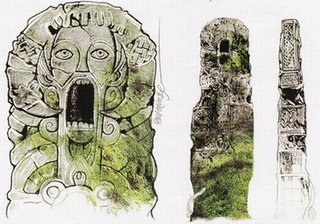
An elderly gentleman asked Del Toro what inspired the character's name Ofelia?
Del Toro responded, "Ofelia is such a beautiful name for a tragic heroine. It may be too high-falutin' the idea that—like in Hamlet—she's an innocent heroine manipulated by so many factions and ultimately meeting a tragic end. Of course [Ofelia] doesn't die in the water but I love the idea of someone who is ultimately innocent [where] nefarious things are happening. Ofelia is a girl that is being told—like we are all told at a certain age—how to behave and what is expected of her. What dress she should wear. How she should behave like a lady. What she should do to regain her kingdom, and so forth. All these things in this case she's strong enough in her will to disregard."
One Hellboy fan complimented Del Toro for his expert comic adaptation. He wanted to know what fans could expect from Hellboy 2?
"I love comic books," Del Toro admitted, "and I grew up in a household where I was reading. My father was a middle class guy and one of the first things he did when he came into money was—he heard it was prestigious to have a library—so he went and bought four encyclopedias. Just by the way they looked, frankly. He bought one that was a Family Health encyclopedia where I learned the word 'fallopian tubes' [laughter]. The other one was an encyclopedia of art, which I read also entirely and so forth. But other than for those books that my father had, another was an anthology of world literature for young readers where I discovered my first Oscar Wilde, Charles Dickens, Victor Hugo, all those in there. At the same time I was reading those things in my father's incredibly abundant library, I was discovering comic books. To me Degas, Renoir, Monet, Manet, Gaugin, Edvard Munch are in equal value as Bernie Wrightson, Richard Corbin, Arthur Suydam, Jack Kirby, I didn't care. I just felt they were equally powerful. When people say, 'We see that you do your personal films and then you do the American movies' I say, 'No. To me Hellboy's personal.' It's autobiographical, frankly. He's born the same day I was born. He was born October 9, 1944 and I was born October 9, 1964. Many details of [Hellboy's] courtship with Liz, are details in the courtship with my wife. I believe that the ideal love story is finding a fire girl and being fire proof. The idea, like in Pan's Labyrinth, at the end of the day the fable is about choice. How you are who you choose to become. Not who you are born like or where you are born. I was born in a small city in Mexico where it was impossible to make films let alone fantastic films. When I got up in my first day of screenwriting class and I declared I wanted to do fantastic movies, I became immediately the town idiot. I believe that with will and hard work you end up bending the world a little bit to live in it. If the first [Hellboy] was the love story, [Hellboy 2] is the first year of marriage. What happens after they kiss fantastically and they live [happily] ever after? Somebody has to wash the socks and take the garbage out. Then it's all wrapped in an adventure about the real world destroying fantasy. How we have absolutely prostituted and ground it into the ground, destroyed fantasy, to build malls and highways. That's the story. The fantasy creatures rebel against the human and Hellboy has to choose which side he's [on]."
A woman complimented Del Toro on showing the scariness of the fairy people, that he didn't clean it up, that Ofelia fucked up but accepted her mistakes and moved on. She was impressed by Ofelia's bravery. That she went into the labyrinth without any fear. The woman said she was engaged by the dark beauty of the film all the way.
Del Toro thanked her and added, "The movie is autobiographical. I explored my entire home town through the sewers. [Laughter.] I went with two or three friends with flashlights and—over the course of three years—we crisscrossed the town through the sewers. I was never afraid. I saw monsters when I was a child. They were probably lucid dreams but I saw creatures. I believed they were real. I was in the Society for the Virgin Mary and we used to do oratory contests in the catacombs of a Catholic church in Mexico, which is equal to having a pyramid built in the center of San Francisco, a Catholic church that had catacombs, and we used to go there, praise the Virgin Mary, and when the priest would turn around we would open the crypts to see if there were bones in them. I was never really afraid. I was curious more than afraid and I think that children are like that. It's curiousity. The Celtic culture I wanted to take through Spain because they are rich and powerful as a culture and as a mythology before moving off to the northern lands. It's seldom used in Spanish films."
Del Toro then thanked everyone for coming and asked that, if we loved the movie as much as he hoped we did, to please—because it's a small movie—go out to the rooftops and shout it out to the world.
Cross-published at Twitch.
No comments:
Post a Comment